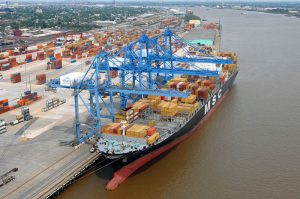ILA to Shut Down East & Gulf Coast Ports
 Expect disruption of imports and exports through East and Gulf Coast ports next week as the International Longshoremen’s Association plans to flex its muscle.
Expect disruption of imports and exports through East and Gulf Coast ports next week as the International Longshoremen’s Association plans to flex its muscle.
Chris Dupin reported in American Shipper:
The International Longshoremen’s Association (ILA) said it is calling for a shutdown of ports along the Atlantic and Gulf Coasts and a march on Washington next week.
A march on Washington immediately brings to mind a protest against the new Trump administration like the International Longshore & Warehouse Union’s (ILWU) protest that shut down the Port of Oakland during Donald Trump’s inauguration as president of the United States.
However, this strike appears to have nothing to do with the controversial new head of state.
The American Shipper article goes on to list the two issues the ILA is protesting with its planned ports shutdown and march:
• Its long-standing desire to eliminate the Waterfront Commission of New York Harbor;
• And the use of state employees at terminals operated by the South Carolina Ports Authority (SCPA).
What’s ironic about this is that Dupin quotes the ILA as saying things like it is protesting “job loss and the resulting negative impacts on America’s economy” and will “highlight hiring practices in some of the nation’s ports that purposely reduce the numbers of dockworkers, causing immeasurable damage to the nation’s economy.”
What makes those statements so ironic is how damaging it is to the ports, jobs, and the nation’s economy when union strikes shut down the ports.
In 2015, when labor strife was at its height between the ILWU and Pacific Maritime Association (PMA), estimates started coming out on just how much port shutdowns cost the U.S. economy per day.
Some estimates were in the one to two billion dollar per day range, but according to a study commissioned by the National Association of Manufacturers and the National Retail Federation put the number at $2.5 billion per day.
The study that came up with those figures was researching what work stoppages of 5, 10, and 20 days would cost the national economy, and the focus seemed to be on West Coast ports.
This work stoppage the ILA has planned for East and Gulf Coast ports should definitely not be for anything close to 5, 10, or 20 days. Therefore, the financial impact to the national economy should not be nearly this large. Of course, you can be assured that it will come at a cost.
Most concerning is that this could be a portend to what is to come during the negotiations for a new contract between the ILA and the United States Maritime Alliance, Ltd. (USMX).
Just last week, Joseph Bonney reported in the Journal of Commerce (JOC) that the ILA and USMX were taking the first steps toward contract bargaining with informal meetings on the subject.
These meetings are several steps away from actual negotiations between the ILA and USMX, but it is ominous that so quickly after the meetings the ILA chooses to organize a shutdown of the ports.
The current contract between the ILA and USMX will expire September 30th, 2018.
Shippers are now forced to look toward the upcoming negotiations with pessimism, which is a sad turn from the optimism created when the USMX and ILA talked of opening discussions on a new, long-term contract over three years before the current one expires.
As usual, when something seems too good to be true…
The ILA, along with the ILWU, has a long history and policy of not agreeing to a new contract before the previous one is expired. The unions’ greatest negotiation leverage comes from strikes and labor slowdowns. These weapons become much more readily available after a contract expires.
How could we honestly expect a new contract negotiated before the current one expires?
Of course, the union shutting down ports over a year before the contract expires is a bit unexpected too.



